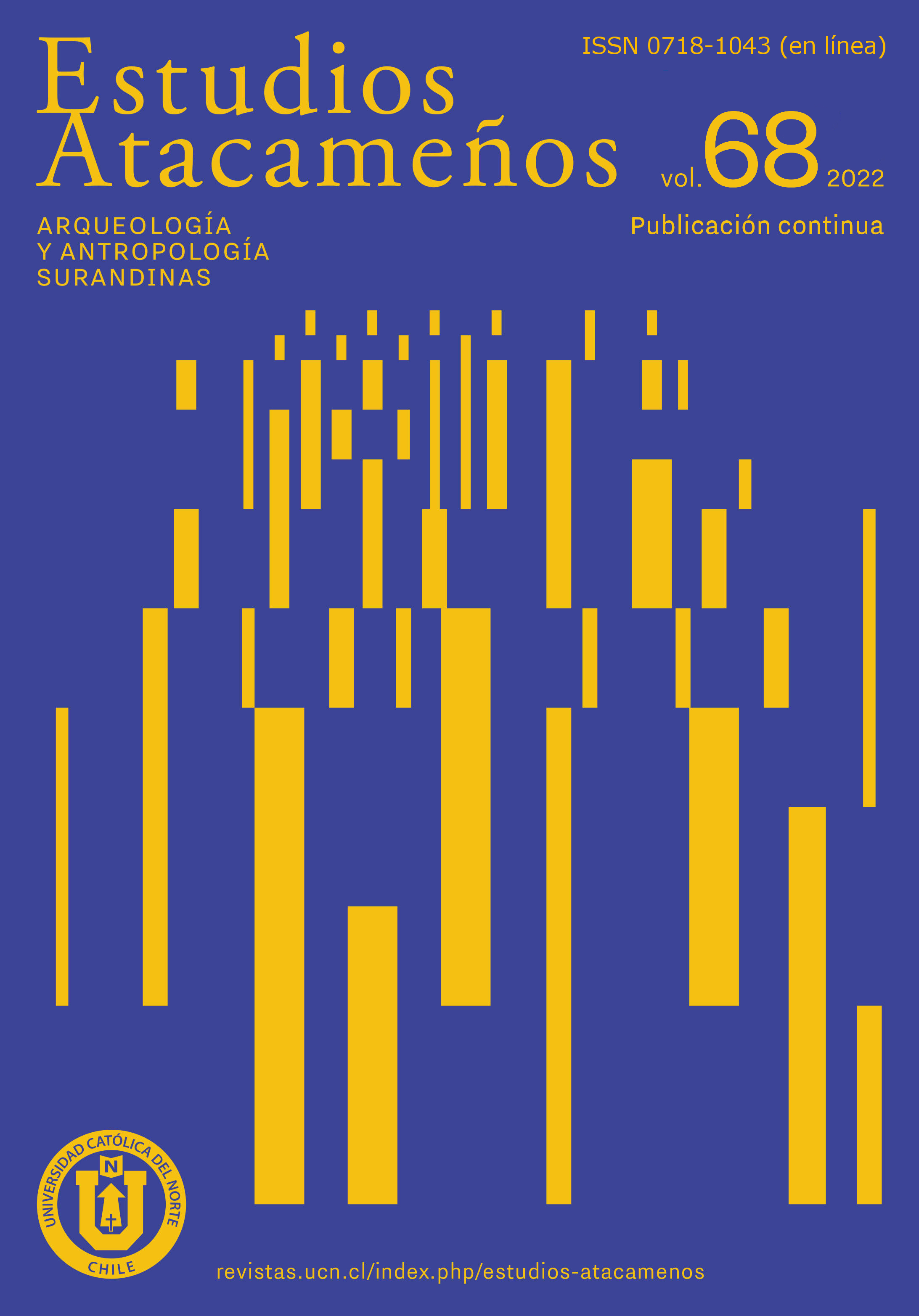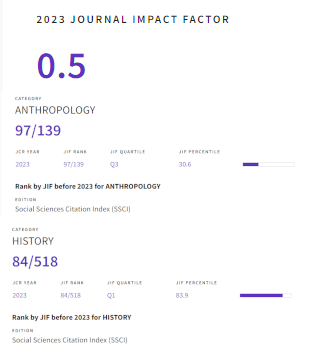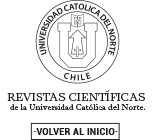Urban prophylaxis and architecture in the bubonic plague epidemic at the north of Chile in the beginning of the 20th century
DOI:
https://doi.org/10.22199/issn.0718-1043-2022-0022Keywords:
isolation hospitals, health architecture, contagious diseases, public health, sanitary stationAbstract
Northern Chile’s port cities experienced bubonic plague epidemics in the early 20th century. The first was in Iquique in 1903. Then, the plague reached Antofagasta in 1904 and devastated Pisagua in 1905. That same year, Chile established a health checkpoint to screen ships entering the country at its northern border with Peru in Arica. Although outbreaks were quelled at times through the lazarettos (isolation hospitals) built to fight the disease and urban prophylactic measures, resurgences of varying intensities continued through the 1920s. The succession of epidemics and the information derived from the urgency of controlling them make it possible to understand and evaluate whether the architectural and urban prevention measures were adequate to control the disease and to identify the impact of these operations.
Downloads
References
Alfaro, C. y Bustos, M. (1936). Reseña histórica de la Provincia de Tarapacá. Imprenta Caras y Caretas.
Aliaga, J. (6 de abril de 1904). La peste bubónica. El Industrial, p. 2.
Arce, I. (1930). Narraciones históricas de Antofagasta. W. T. Uriarte.
Armus, D. (2002). La enfermedad en la historiografía de América Latina moderna. Asclepio, 54 (2), 41-60. https://doi.org/10.3989/asclepio.2002.v54.i2.140
Bonastra, J. (2006). Ciencia, sociedad y planificación territorial en la institución del lazareto [Tesis de Doctorado, Universidad de Barcelona]. Repositorio Institucional - Universidad de Barcelona. https://bit.ly/3S52cVh
Bonastra, J. (2012). Las formas de la reforma asistencial. El nacimiento de los lazaretos y de los hospitales renacentistas. En A. Pagés (Dir.), Giginta, de la charité au programme social (pp.197-217). Universitaires de Perpignan. https://doi.org/10.4000/books.pupvd.3606
Brazil: Additional Report of Plague in Chile. (1905). Public Health Reports (1896-1970), 20(13), 562. https://bit.ly/3QOg5Gt
Brazil: Bubonic Plague in Chile. (1905a). Public Health Reports (1896-1970), 20(16), 712–713. https://bit.ly/3U8e8rr
Brazil: Bubonic Plague in Chile. (1905b). Public Health Reports (1896-1970), 20(17), 771–772. https://bit.ly/3BnBcdb
Brazil: Plague in Chile. (1905). Public Health Reports (1896-1970), 20(15), 661. https://bit.ly/3DsWpEZ
Brazil: The Plague Epidemic in Pisagua, Chile. (1905). Public Health Reports (1896-1970), 20(13), 560. https://bit.ly/3ROvSpU
Burdett, H. (1893). Hospitals and asylums of the world: their origin, history, construction, administration, management, and legislation. Hospital construction, with plans and bibliography. (Vol. 4) J. & A. Churchill.
Cabrera, J. (2005). La epidemia de peste bubónica en Iquique, 1903: un acercamiento global. Revista de historia (Concepción), 15, 71-84. https://bit.ly/3S7Ao2F
Calcagno, S. y Vásquez, J. (2018). Historia de la medicina en Iquique y Tarapacá, Autoedición. https://bit.ly/3RSm3Yb
Cámara de Diputados (14 de agosto de 1907). Sesión 44ª ordinaria en 14 de agosto de 1907, presidencia del señor Puga Borne. https://bit.ly/3BNloBR
Chávez, P. (2021). La peste bubónica en el puerto de Arica (1903-1928). Diálogo andino, (64), 215-224. http://dx.doi.org/10.4067/S0719-26812021000100215
Chile: End of Plague at Iquique. (1903). Public Health Reports (1896-1970), 18(46), 2009. https://bit.ly/3S9n1iC
Chile: Plague at Iquique. (1903a). Public Health Reports (1896-1970), 18(22), 842. https://bit.ly/3S7tk68
Chile: Plague at Iquique. (1903b). Public Health Reports (1896-1970), 18(32), 1309. https://bit.ly/3RSwQ4u
Chile: Report from Antofagasta. Plague Extinct. (1904). Public Health Reports (1896-1970), 19(30), 1470. https://bit.ly/3DAxOhA
Chile: Report from Iquique. Suspect Plague and Smallpox. Epidemic Plague in Pisagua. (1905). Public Health Reports (1896-1970), 20(18), 827–828. https://bit.ly/3Ln9nWT
Chile: Report from Iquique. Sanitary Conditions at Arica and Antofagasta. Plague. (1908). Public Health Reports (1896-1970), 23(31), 1108. https://bit.ly/3qLaiqM
Cholera, Yellow Fever, Plague, and Smallpox, June 27, 1903, to October 2, 1903. (1903a). Public Health Reports (1896-1970), 18(40), 1687–1691. https://bit.ly/3qMOPNS
Cholera, Yellow Fever, Plague, and Smallpox, June 27, 1903, to October 30, 1903. (1903b). Public Health Reports (1896-1970), 18(44), 1914–1918. https://bit.ly/3BqlcH6
Cholera, Yellow Fever, Plague, and Smallpox, June 27, 1903, to November 6, 1903. (1903c). Public Health Reports (1896-1970), 18(45), 1963–1967. https://bit.ly/3QJNToc
Cholera, Yellow Fever, Plague, and Smallpox, June 27, 1903, to December 18, 1903. (1903d). Public Health Reports (1896-1970), 18(51), 2270–2274. https://bit.ly/3qMP1wA
Cholera, Yellow Fever, Plague, and Smallpox, December 31, 1904, to March 17, 1905. (1905a). Public Health Reports (1896-1970), 20(11), 476–479. https://bit.ly/3SdHBy2
Cholera, Yellow Fever, Plague, and Smallpox, December 31, 1904, to March 24, 1905. (1905b). Public Health Reports (1896-1970), 20(12), 523–527. https://bit.ly/3BPqfT7
Cholera, Yellow Fever, Plague, and Smallpox, December 31, 1904, to April 7, 1905. (1905c). Public Health Reports (1896-1970), 20(14), 628–632. https://bit.ly/3DrCOFk
Cholera, Yellow Fever, Plague, and Smallpox, December 31, 1904, to May 19, 1905. (1905d). Public Health Reports (1896-1970), 20(20), 955–959. https://bit.ly/3Du7Lsv
Crónica. (6 de abril de 1904). El Industrial, 2.
Crónica. (19 de abril de 1904). El Industrial, 2.
Crónica de Antofagasta: El Código Sanitario en acción. (1923). La Ilustración (Antofagasta), 1(4), 4.
Cueto, M. (1997). El regreso de las epidemias: salud y sociedad en el Perú del siglo XX. Instituto de Estudios Peruanos.
Cueto, M. y Palmer, S. (2015). Medicina e saúde pública na América Latina, uma história. Fiocruz.
del Río, A. (1901). Cartillas Sanitarias: La peste bubónica. Imprenta Cervantes.
del Río, A. (1902). VIII Memoria del Instituto de Hijiene de Santiago, correspondiente al año 1900. Revista Chilena de Hijiene, 7, 232-301.
del Río, A., Zegers, R., Dávila, R. y Montero, L. (1904-1905). Informe sobre la epidemia de peste bubónica en Iquique en 1903, presentado al supremo gobierno por la comisión encargada de reconocer la naturaleza de la enfermedad i de organizar su profilaxia. Revista Chilena de Hijiene, 9, 1-193. https://bit.ly/3DIrIfk
Donoso, C. (2008). 1868: un annus horribilis en la historia de Iquique. Revista de Ciencias Sociales (CI), (20), 37-60. https://bit.ly/3BfCjvi
Echenberg, M. (2007). Plague ports: the global urban impact of bubonic plague, 1894-1901. New York University.
Echeverría y Reyes, A. (23 de abril de 1904). Importante informe. El Industrial, 2.
Echeverría y Reyes, A. (1905-1906). Memoria. Antofagasta, 23 de abril de 1904. Revista Chilena de Hijiene, 10, 73-76.
Estraña enfermedad. (5 de abril de 1904). El Industrial, 2.
Ferrer, P. (1911a). Consejo Superior de Higiene Pública. En Ferrer, P. (Ed.). Higiene y asistencia pública en Chile (pp. 34-40). Imprenta, Litografía y Encuadernación Barcelona.
Ferrer, P. (1911b). Enfermedades infecciosas. En Ferrer, P. (Ed.). Higiene y asistencia pública en Chile (pp. 415-425). Imprenta, Litografía y Encuadernación Barcelona.
Galeno-Ibaceta, C., González, J. A. (2016). Salubridad urbana en ciudades puerto del norte de Chile: primeras operaciones y equipamientos de salud en Arica, Iquique y Antofagasta. En R. Booth y M. Cortés (Coords.), Actas primer Congreso Iberoamericano de Historia Urbana, 23-25 de noviembre de 2016 (pp. 577-587). Asociación Iberoamericana de Historia Urbana. https://bit.ly/3LjPyzE
Galeno-Ibaceta, C., Toro-Cortés, C. (2019). Estrategias urbanas y arquitectura hospitalaria: los casos de Arica, Iquique y Antofagasta en el norte de Chile, 1871-1906. Actas del 2º Congreso Iberoamericano de Historia Urbana, México, Asociación Iberoamericana de Historia Urbana, 2019, (2), 2882–2895. https://bit.ly/3SlZPO9
Howard, J. (1789). An account of the principal lazarettos in Europe. Warrington. https://bit.ly/3R1cPri
Illanes, M. (1993). En el nombre del pueblo, del Estado y de la ciencia: Historia social de la salud pública, Chile 1880-1973 (Hacia una historia social del siglo XX). Colectivo de Atención Primaria.
Italy: Plague in Chile. (1903). Public Health Reports (1896-1970), 18(27), 1073. https://bit.ly/3R1sqqM
Junta de Beneficencia de Antofagasta (1873). Memoria que presenta la Junta de Beneficencia de Antofagasta al fin de su primer año de existencia. Tipografía del Caracolino por P. Fuentes. https://bit.ly/3BYAOTW
La peste bubónica, su declaración oficial. Numerosos casos. Medidas de las autoridades para combatirla. (6 de abril de 1904). El Industrial, pp. 2-3.
Larraín Bravo, R. (1910). La higiene aplicada en las construcciones (vol. 2). Imprenta Cervantes.
Laval, E. (2003). La peste bubónica en Chile. Revista Chilena de Infectología, 20, 96-97. http://dx.doi.org/10.4067/S0716-10182003020200033
de Leon, P. M. y Harman, A. (1901). Lack of quarantine stations on the west coast of South America. Public Health Reports (1896-1970), 16(13), 613–614. https://bit.ly/3UfiVqR
León, S., Vergara, F., Padilla, K. y Bustos, A. (2007). Historia de la postal en Chile. Pontificia Universidad Católica de Valparaíso.
Ley N° 1.197. Enfermedades infecciosas. Diario Oficial de la República de Chile, Santiago, Chile, 7 de febrero de 1899. http://bcn.cl/2wfyx
Lo Chávez, D. (2015). Morir en el antiguo Iquique: cementerios, salud pública y sectores populares durante la epidemia de peste bubónica de 1903. Nuestro Norte, revista del Museo Regional de Iquique, 1, 13-37. https://bit.ly/3C7MWlH
Macchiavello, A. (1932a). Historia de la peste en Chile. Cisneros.
Macchiavello, A. (1932b). Estudio sobre las ratas del puerto de Antofagasta en relación con las epidemias de peste bubónica. Revista del Instituto Bacteriológico de Chile y de la Sociedad de Microbiología e Higiene, 3(1), 39-72.
Napias, H. (1893). Pavillons et hopitaux d’isolement. En J. Rochard (directeur). Encyclopédie d'hygiène et de médecine publique. (Vol. 5, pp. 504-508). L. Bataille et Cie. https://bit.ly/3S4hg5Y
Palma, P., Lizarme, N. (2021). Epidemias en los márgenes: la peste bubónica (1903-1905) y el Covid-19 en el sur andino peruano. Revista Ciencias de la Salud, 19, 1-23. https://doi.org/10.12804/revistas.urosario.edu.co/revsalud/a.10596
Peru: Report from Callao. Plague Situation in Peru and Chile. Smallpox in Chilean Ports. Vaccination of Crew on Steamship Tucapel at Valparaiso. Indorsements on Bills of Health of Steamship Limari. (1905). Public Health Reports (1896-1970), 20(17), 788–789. https://bit.ly/3BXEs05
Peru: Report from Callao. Recurrence of Plague in Callao. Plague Situation in Peru and Chile. (1905). Public Health Reports (1896-1970), 20(11), 472. https://bit.ly/3R5d84m
Pimstein, A. (1970). Algunas referencias históricas para el estudio de la medicina pública en Chile: desde la conquista hasta la fusión de los servicios médico-sociales (1541-1942). Universidad de Chile.
Puga Borne, F. (1886). Como se evita el cólera. Estudios de hijiene popular. Imprenta Nacional.
Puga Borne, F. (1894). Segunda memoria del Instituto de Hijiene de Santiago. Revista Chilena de Hijiene, 1(2), 217-375.
Ramos de Dios, J. (2010). Encuentro Internacional sobre Arquitectura y Urbanismo en América. Universidades UNICAMP y PUC de Campinas, São Paulo, Brasil. Historia, crítica y teoría de ciudad y arquitectura. Balance argentino. Revista de Arquitectura, 16(21), 13-17. https://doi.org/10.5354/0719-5427.2010.27879
République Française (1899). Recueil des Travaux du Comité Consultatif D’Hygiène Publique de France et des Actes Officiels de L’Administration Sanitaire. (Vol. 29). Melun Imprimiere Administrative. https://bit.ly/3R0KG3J
Ríos, C. (1911), La estación sanitaria de Arica. En P. Ferrer (Ed.). Higiene y asistencia pública en Chile (pp. 463-484). Barcelona. https://bit.ly/3UrnCxQ
Ríos, C. (1914), Arica en el presente i en el porvenir: su saneamiento. La Ilustración.
Silva Narro, D. (1913). Guía administrativa, industrial y comercial de las provincias de Tacna, Tarapacá y Antofagasta. Chile. https://bit.ly/3qU5cbs
Summary of Sanitary Reports. (1905). Public Health Reports (1896-1970), 20(20), 899–902. https://bit.ly/3DDAsTT
Telegramas. Noticias trasmitidas por la Ajencia Havas. (15 de abril de 1905). El Industrial, p. 3.
Tollet, C. (1889). Les hôpitaux au XIXe siècle: études, projets, discussions et programmes relatifs à leur construction. Chez L’Auteur. https://bit.ly/3dwCEBX
Urrutia, R.; Lanza, C. (1993). Catástrofes en Chile: 1541-1992. La Noria.
Wormald, A. (1972). Historias olvidadas del Norte Grande. Universidad del Norte.
Downloads
Published
Issue
Section
License
Copyright (c) 2022 Claudio Galeno-Ibaceta

This work is licensed under a Creative Commons Attribution 4.0 International License.

All works published in Revista Estudios Atacameños (ISSN on line:0718-1043) Revista Estudios Atacameños Creative Commons International 4.0 attribution (CC BY 4.0) licence.
Authors remain the owners of their work and may republish their articles elsewhere without having to request permission, as long as they indicate that the work was originally published in Revista Estudios Atacameños (ISSN on liine:0718-1043).












